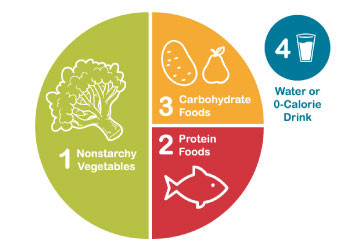Are Nigerian foods good for people living with diabetes?
Oh yes! Nigerian meals and delicacies are good for people with diabetes especially when they follow the diabetic plate method and guidance of health professionals on portion sizes and personalizing your plate.
Eating healthy for diabetes has often been termed a Diabetic Diet however, this isn’t so. Eating for diabetes is actually healthy eating. While people and even researchers in previous years have focused on single nutrients, looking at active components or functional properties in food with evidence and claims like high fiber, insulin-producing, insulin sensitive; people actually do not eat individual nutrients or active components of food alone but eat in specific ways otherwise known as eating patterns.
How meals are combined or the different classes of food put on a plate is the way in which people eat. You don’t eat basmati rice alone nor acha alone or oatmeal alone, you often combine them in certain ways. The fact remains that active components or functional properties of a specific food are good but eating pattern would tell you more about if your Nigerian meals are good.
Are Nigerian meals really good for diabetes?
Oh yes, Nigerian meals and delicacies are good for people with diabetes especially when they follow the diabetic plate method and guidance of professionals on portion sizes and personalizing your plate.

The American Diabetes Association recommends Nutrition Therapy Recommendations for the Management of Adults With Diabetes that personal preferences such as tradition, culture, health beliefs, and economic and health goals should inform recommendation of any eating pattern for persons with diabetes. The position statement also states that there are different diet approaches to achieving stable good sugar control but eating patterns are a discussion for another day!
What makes Nigerian meals really good for diabetes?
Nigerian meals are super packed with adequate amounts of macronutrients and micronutrients e.g Amala + Ewedu soup + Titus Fish or Wheat + Afang soup + Chicken. Ewedu is rich in iron, Amala is a complex carbohydrate which is slow releasing carbohydrate, and Titus Fish is an animal protein which has good biological value providing the body with necessary amino acids for build-up, repair and immune support functions. Titus Fish also contains a healthy fat which contains omega3 fatty acids which promotes heart health. All of these body functions are very important for people with diabetes.
What makes it bad for Diabetes?
First is the carbohydrate content in plate/ portion: The biggest challenge for people with diabetes is that they cannot use sugar effectively as a result of insulin resistance or decreased pancreatic beta function. Despite this physiological challenge or demand many people still consume excessive amounts of carbohydrates on the table. Our food habits and culture doesn’t portion carbohydrate meals, rather 90 - 95% of our plate is filled up with carbs. Healthy eating requires portioning carbohydrate content per meal. Platos Health might recommend a 45g per meal for you if you follow the Low Fat-High Fiber eating pattern to keep your carb intake within close range.
Inadequate non- starchy vegetables intake: Despite overwhelming benefits of non-starchy vegetables like bitter leaf, okro, utazi, efinrin, waterleaf, broccoli, cabbage, lettuce and their phytochemical and nutraceutical properties.This is commonly a missing piece as we see people eating bread and stew, rice and stew, yam and stew, eba and stew etc. Vegetables are low in carbohydrates and contain antioxidants properties which help in fighting free radicals that cause inflammation which has been associated with type 2 diabetes. Non- starchy vegetables are low carb friendly and a simple approach to weight in diabetes management.
Cooking method and processing: While carbohydrate seems to be a major focus for people with diabetes, other important biomarkers are blood pressure and cholesterol. Excessive sodium intake, excessive saturated fat intake are found in many meals in Nigeria. Excessive processing has also been seen to reduce fiber intake in some meals making glucose absorption faster e.g Some with bread, Polished white rice.
Now that you know Amala isn’t in itself bad for you nor is Eba the problem. The biggest support Platos Health is recommending is how you personalize your plate while achieving good glycemic control and promoting healthy meals.
Ensuring healthy eating patterns, following recommended portions, adequate cooking or processing methods that makes living with diabetes interesting and enjoyable.
We invite you to join our community where you can learn more and relate with like-minded people who are managing their diabetes.